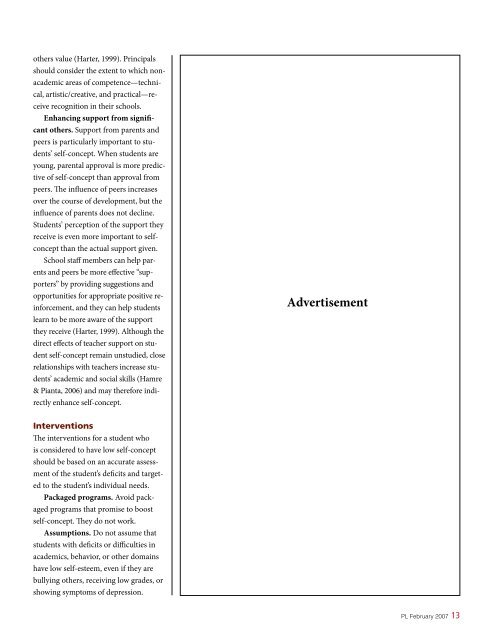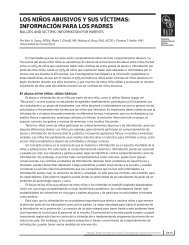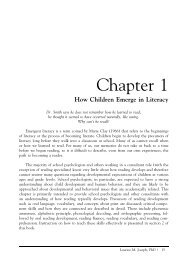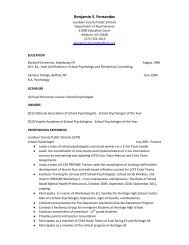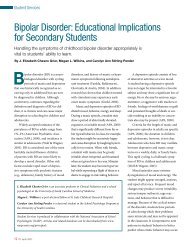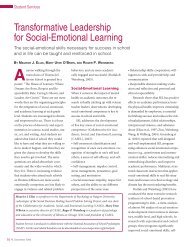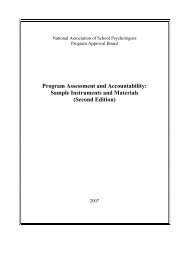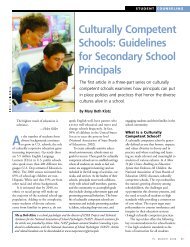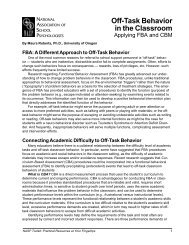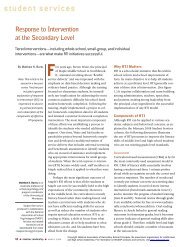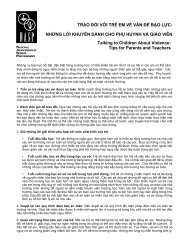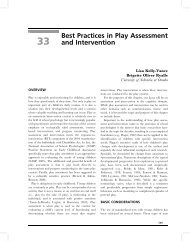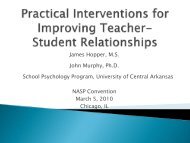Self-Concept and Self-Esteem in Adolescents - National Association ...
Self-Concept and Self-Esteem in Adolescents - National Association ...
Self-Concept and Self-Esteem in Adolescents - National Association ...
Create successful ePaper yourself
Turn your PDF publications into a flip-book with our unique Google optimized e-Paper software.
others value (Harter, 1999). Pr<strong>in</strong>cipals<br />
should consider the extent to which nonacademic<br />
areas of competence—technical,<br />
artistic/creative, <strong>and</strong> practical—receive<br />
recognition <strong>in</strong> their schools.<br />
Enhanc<strong>in</strong>g support from significant<br />
others. Support from parents <strong>and</strong><br />
peers is particularly important to students’<br />
self-concept. When students are<br />
young, parental approval is more predictive<br />
of self-concept than approval from<br />
peers. The <strong>in</strong>fluence of peers <strong>in</strong>creases<br />
over the course of development, but the<br />
<strong>in</strong>fluence of parents does not decl<strong>in</strong>e.<br />
Students’ perception of the support they<br />
receive is even more important to selfconcept<br />
than the actual support given.<br />
School staff members can help parents<br />
<strong>and</strong> peers be more effective “supporters”<br />
by provid<strong>in</strong>g suggestions <strong>and</strong><br />
opportunities for appropriate positive re<strong>in</strong>forcement,<br />
<strong>and</strong> they can help students<br />
learn to be more aware of the support<br />
they receive (Harter, 1999). Although the<br />
direct effects of teacher support on student<br />
self-concept rema<strong>in</strong> unstudied, close<br />
relationships with teachers <strong>in</strong>crease students’<br />
academic <strong>and</strong> social skills (Hamre<br />
& Pianta, 2006) <strong>and</strong> may therefore <strong>in</strong>directly<br />
enhance self-concept.<br />
Interventions<br />
The <strong>in</strong>terventions for a student who<br />
is considered to have low self-concept<br />
should be based on an accurate assessment<br />
of the student’s deficits <strong>and</strong> targeted<br />
to the student’s <strong>in</strong>dividual needs.<br />
Packaged programs. Avoid packaged<br />
programs that promise to boost<br />
self-concept. They do not work.<br />
Assumptions. Do not assume that<br />
students with deficits or difficulties <strong>in</strong><br />
academics, behavior, or other doma<strong>in</strong>s<br />
have low self-esteem, even if they are<br />
bully<strong>in</strong>g others, receiv<strong>in</strong>g low grades, or<br />
show<strong>in</strong>g symptoms of depression.<br />
Advertisement<br />
PL February 2007 13


